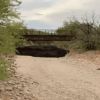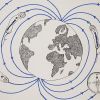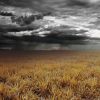-
 +17 +5
+17 +5A Shocking Percentage of Our Planet's CO2 Emissions Is Directly Traced to Multinational Companies
New research shows that around a fifth of all carbon emissions in recent years has come from the assets and suppliers of multinational corporations – and the flow of money indicates that pollution is effectively being outsourced from the developed world
-
 +11 +3
+11 +3Meteorite study suggests Earth may have always been wet
A new study finds that Earth’s water may have come from materials that were present in the inner solar system at the time the planet formed — instead of far-reaching comets or asteroids delivering such water. The findings published Aug. 28 in Science suggest that Earth may have always been wet.
-
 +3 +1
+3 +1What is a "Bomb Train" and why has the Trump administration legalized them?
From Rolling Stone: A new Trump administration rule relaxing guidelines that govern the transport of liquefied natural gas could create “bomb trains” with enough explosive power to level whole cities
-
 +16 +2
+16 +2A Simple Change to Cafeteria Menus Could Make a Massive Difference to The Planet
We all know by now that eating less meat is good for the planet - the production of meat products for human consumption leaves behind a hefty carbon footprint.
-
 +17 +3
+17 +3This Bizarre River of Black Sludge in Arizona Is Totally Real
On 15 July 2020, what looked like your typical dry waterway was engulfed by a sickening dust puffing black sludge, reminiscent of the villainous cartoon toxin, Hexxus from FernGully: The Last Rainforest.
-
 +15 +1
+15 +1How bacteria read and follow the Earth’s magnetic field
Magnetotactic bacteria have magnetosomes with which they can sense magnetic field lines. This allows magnetotactic bacteria to swim towards North or South
-
 +4 +1
+4 +1A 'regime shift' is happening in the Arctic Ocean, scientists say
Scientists at Stanford University have discovered a surprising shift in the Arctic Ocean. Exploding blooms of phytoplankton, the tiny algae at the base of a food web topped by whales and polar bears, have drastically altered the Arctic's ability to transform atmospheric carbon into living matter. Over the past decade, the surge has replaced sea ice loss as the biggest driver of changes in uptake of carbon dioxide by phytoplankton.
-
 +3 +1
+3 +1Why Birds Can Fly Over Mount Everest
A story for my granddaughter about oxygen, evolution, and our planet’s fate.
-
 +3 +1
+3 +1"Extinction breeds extinctions": How losing one species can wipe out many more
Humans are causing a mass extinction. And humans can stop it.
-
 +4 +1
+4 +1Rivers help lock carbon from fires into oceans for thousands of years
The extent to which rivers transport burned carbon to oceans—where it can be stored for tens of millennia—is revealed in new research led by the University of East Anglia (UEA). The study, published today in Nature Communications, calculates how much burned carbon is being flushed out by rivers and locked up in the oceans.
-
 +20 +3
+20 +3Earth is accelerating towards sixth mass extinction that could see 'end of civilisation'
Stop The Wildlife Trade: ‘Extinction breeds extinction’, says grim new study revealing more than 500 species are on course to go extinct in next two decades - around the same figure for the whole of the twentieth century
-
 +15 +6
+15 +6Glimmer of hope for world's rarest primate
The discovery of a new breeding pair raises hope for the future of a critically endangered gibbon.
-
 +12 +1
+12 +1The Mysterious Anomaly Weakening Earth's Magnetic Field Seems to Be Splitting
New satellite data from the European Space Agency (ESA) reveal that the mysterious anomaly weakening Earth's magnetic field continues to evolve, with the most recent observations showing we could soon be dealing with more than one of these strange phenomena.
-
 +19 +4
+19 +4Scientists explain magnetic pole's wanderings
The North Magnetic Pole has been racing across the top of the world, from Canada towards Siberia.
-
 +3 +1
+3 +1Coronavirus calm reveals flourishing Venice Lagoon ecosystem
"The flora and fauna of the lagoon have not changed during lockdown. What has changed is our chance to see them," says zoologist Andrea Mangoni, plunging his camera into Venice's normally murky waters to observe life. A crab tries to grab the intruding lens, jellyfish propel themselves along near the surface, schools of fish swim peacefully by, crustaceans cling to the city's famous jetties, and seaweed of every colour wafts gently on the current.
-
 +20 +4
+20 +4Soil gets its smell from bacteria trying to attract invertebrates
Soil’s earthy smell comes from chemicals produced by bacteria called Streptomyces, which use the odour to attract springtails to help disperse their spores
-
 +11 +2
+11 +2The 500-million-year-old reason behind the unique scent of rain
New research from an international team of scientists is suggesting that instantly recognizable earthy smell after rain is released by bacteria trying to attract a particular arthropod as a way to spread its spores.
-
 +3 +1
+3 +1In Just 10 Years, Warming Has Increased the Odds of Disasters
Small levels of global warming can increase the likelihood of extreme events, new research warns. That’s prompting scientists to question how accurately disasters in the recent past can be used to predict extreme events today.A study published Wednesday in Science Advances suggests that some research attributing climate change to individual disasters has underestimated the probability of certain extremes in the last decade. That’s especially true of unprecedented hot and wet events.
-
 +17 +2
+17 +2What causes an ice age to end?
New University of Melbourne research has revealed that ice ages over the last million years ended when the tilt angle of the Earth's axis was approaching higher values.
-
 +29 +3
+29 +3There's an unlikely beneficiary of coronavirus: The planet
Factories were shuttered and streets were cleared across China's Hubei province as authorities ordered residents to stay home to stop the spread of the coronavirus. It seems the lockdown had an unintended benefit -- blue skies.
Submit a link
Start a discussion




















